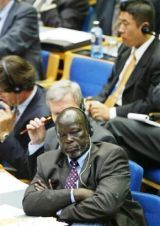HRW, Oxfam say new Security Council resolution on Sudan’s Darfur weak
NAIROBI, Nov 22, 2004 (IRIN) — The non-governmental organisations (NGOs)
Human Rights Watch (HRW) and Oxfam have criticised the latest UN Security
Council’s resolution on Sudan, saying it did not go far enough in trying
to pressure the Sudanese government to stop the violence that has spawned
a major humanitarian crisis in the western region of Darfur.

|
|
Sudan People’s Liberation Movement leader John Garang listens to a speech by Sudanese Vice President Ali Osman Taha, Friday, Nov. 19, 2004 during the U.N Security Council meeting in Nairobi. (AP). |
The Council’s resolution 1574 – adopted on 19 November, the last day of a
two-day special session in the Kenyan capital, Nairobi – demanded that the
Sudanese government, rebel forces and other armed groups in Darfur cease
all violence and ensure that their members comply with international
humanitarian law.
It also endorsed the commitment of the government and the rebel Sudan
People’s Liberation Army Movement/Army (SPLM/A) to reach a final peace
agreement on the conflict in the south before the end of 2004.
“For the south, it [the resolution] is a step forward,” Jemera Rone, HRW’s
researcher for East Africa and Sudan, told IRIN soon after the resolution
was adopted, but added, “the Security Council resolution on Darfur is very
weak and is a step back from the two prior resolutions.”
“It specifically does not repeat what the Security Council said before,
that the government has to disarm and prosecute the Janjawid [militias).
There is not a word in there about that in those terms. There is general
reference to human rights abuses being committed without saying who is
responsible, but it does not say anything about the government’s specific
duty and promise to prosecute the Janjawid and to disarm them.”
The Council’s resolution demanded that the government and all armed groups
in Darfur to “immediately cease all violence and attacks – including
abduction, refrain from forcible relocation of civilians, cooperate with
international humanitarian relief and monitoring efforts, ensure that
their members comply with international humanitarian law, facilitate the
safety and security of humanitarian staff, and re-inforce throughout their
ranks their agreement to allow unhindered access and passage by
humanitarian agencies and those in their employ”.
“I am afraid the government will take this as some kind of a pat on the
back by the Security Council because that is the way the government
operates diplomatically,” said Rone. “They will disregard the two prior
resolutions and they will take this resolution and show it to all their
friends and say, ‘Look they didn’t really say we did anything in Darfur,
they didn’t condemn, they are not threatening sanctions,” Rone said.
She said that Khartoum was likely to see the resolution as the Council
“turning a blind eye and they will be encouraged to continue to persecute
the civilians of Darfur”.
Rone said the Council seemed to be “operating under the mistaken
assumption that if they go soft on Darfur, then the government will sign
the North-South peace deal”. She said the countries that were pushing for
an end to the conflict in the south last year had at that time also failed
to pressure Khartoum to stop atrocities in Darfur, leading to what she
said a “vicious ethnic cleansing campaign” in the region.
Oxfam’s spokesman Brendan Cox also welcomed the Council’s efforts to move
the peace process in southern Sudan forward, but said the resolution would
have no impact on the crisis in Darfur.
“People are dying in Darfur – people are dying in Darfur today. There are
200,000 people that we can’t currently reach because of the security
situation,” Cox told IRIN in Nairobi on Friday. “This resolution is going
have absolutely no impact on the people of Darfur.
“What we would have liked to see is that some of the countries like the US
and the UK, who were supporting a strong resolution – we would have liked
them to come out fighting a little bit stronger, perhaps to really push
this forward. Instead, they have agreed on a compromise resolution – it
seems they have gone backwards rather than forward and that is condemning
the people of Darfur to death,” Cox said.
Earlier, John Danforth, the US Permanent Representative to the UN and the
president of the Security Council for the month of November said that
“chaos and cruelty remain the order of the day” in Darfur and urged
parties to the conflict to heed the Council’s message to end the violence.
The European Union (EU) also expressed concern that the Sudanese
government had not fulfilled many of its obligations under two previous
Council resolutions on Darfur, particularly its promise to disarm the
Janjawid militias and bring the perpetrators of human rights abuse to
justice.
“At the same time, the rebel groups, by stepping up their attacks, have
contributed to an escalation in insecurity and human suffering,” the EU
said in a statement delivered to the Council by the Netherlands ambassador
to Sudan, Adriaan Kooijmans.
“The EU will continue to exert pressure on both sides,” he said. “The EU
will take appropriate measures, including sanctions, against the
government of Sudan and all parties if no tangible progress is achieved in
this respect.”
In his address to the Council on 18 November, Sudan’s First Vice-President
Ali Uthman Taha described the conflict in Darfur as a “political war
involving local powers backed by foreign circles that profit from the
local contradictions in Darfur”. He said the problem there had been
exacerbated by drought and desertification.
